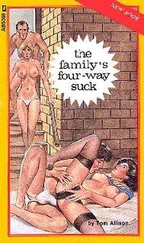“What do you think Fleur will say if I ask her about her brother?” I shout after him.
He’s gone: vanished around a corner. It would be undignified to chase him. Pointless, too.
Should I burst into the Year 8 class on my right and demand the truth? Surely someone in the room would raise their hand and say “Me!” if I blurted out, “Who knows George Donbavand?”
Of course he’s real. There’s no doubt. If Fleur exists, then George must.
Years ago, while working on a TV thriller, I spent some time with a psychotherapist who profiled for the police. She told me the most dangerous and frightening liars are those who attempt to deceive even when there’s no chance of convincing anyone, who savor the inability of the honest world to believe they would maintain their pretense in the face of proof to the contrary.
It chills me to think that this category now includes the head of Ellen’s school and her form tutor.
I hear glass smashing. Not loud, like a window breaking, but small and contained. The blare of an alarm fills the corridor. I flatten myself against the wall as children start to pour out of classrooms, guided by teachers pointing and mouthing inaudible words.
Lesley Griffiths hurries past me, then turns back. She frowns and gestures at me. “Why are you standing still? You need to leave the building. Fire alarm,” she mouths.
“It was you,” I say to her departing back. “You smashed the glass, to get me out.”
She can’t hear me. I can’t hear myself.
Chapter 4
Pas Devant les Enfants
After the unknown miscreant tried to kill Perrine by hanging her from a tree, everything changed for the Ingrey family. Later that same night, once Perrine had been checked by a doctor and the rope burns on her neck had been attended to, Bascom and Sorrel said something to their three daughters that they had never said before: “We need to talk in private, girls. It is likely to take a long time. You’ll have to forage in the fridge and pantry for your own supper.”
Lisette, Allisande and Perrine were shocked. Their home, Speedwell House, was one that had never contained an apartheid system with the grown-ups on one side and the children on the other. It always struck them as peculiar, when they visited the homes of friends, that other families behaved in this way. Lisette’s friend Mimsie Careless, for example, had parents who ended conversations midsentence the instant she walked into a room, plastered bright smiles on their faces and said in falsely hearty voices, “Hello, darling! How lovely to see you!” For years, Lisette had been convinced that Mr. and Mrs. Careless were spies for a foreign power, until Sorrel had explained to her that a lot of adults suffer from weird neuroses that they keep at bay by depriving their children of important information about life.
Allisande had a friend called Henrietta Sennitt-Sasse whose mother wouldn’t answer any questions in front of her daughter, not even the most innocent ones. If Bascom or Sorrel drove Allisande to Henrietta’s house to drop her off and happened to ask Mrs. Sennitt-Sasse a question like, “Oh, is that a new lavender plant I see in your front garden?” or “What do you think of Marathon bars changing their name to Snickers?,” Mrs. Sennitt-Sasse would tighten up her face and mutter through shrunken lips, “ Pas devant les enfants ,” which means “Not in front of the children” in French. Only after Allisande and Henrietta had gone up to Henrietta’s room would Mrs. Sennitt-Sasse answer, once she’d checked that the girls were nowhere in earshot.
The Ingreys had great fun mercilessly mocking the Sennitt-Sasse approach. Sorrel would rock with laughter as she told her family the punchline each time: “And after all that, and with me waiting on tenterhooks to hear this alluring secret that couldn’t be spoken of in front of little pitchers with big ears, all the stupid woman said was, ‘Yes, it’s a new lavender. I bought it half price from the garden center on the weekend. There was a sale.’ ”
Until the day that someone tried to hang Perrine from a tree, Bascom and Sorrel Ingrey had been willing to discuss anything and everything in front of their three daughters. They did not hide strong opinions, or critical ones. In truth, they didn’t have very many opinions that were not strong and critical, and it would have been ridiculous never to allow the girls to hear them speak! In the Ingrey household, the children were not protected from contentious or controversial subjects, because almost anything you cared to name was contentious and controversial for the Ingreys, from when to set off for an important event (with at least an hour to spare in case something goes wrong, insisted Bascom; no, at the very last possible moment to avoid wasting time, countered Sorrel) to how best to handle the family finances (employ an expensive accountant to save yourself a lot of trouble, said Sorrel; keep pernickety, encyclopedic records and fill in every form yourself in order to save money, said Bascom).
I hope you will understand, then, that for the three girls to be told to make themselves scarce while their parents had a private discussion—in their bedroom with the door shut and locked—was so unusual, it was frightening. For Lisette, Allisande and Perrine, being excluded in this way and being able to make out only whispering and hissing was nearly as traumatic as the whole hanging-from-a-tree-attempted-murder incident. Yes, even for Perrine.
The girls didn’t go down to the kitchen and forage for their supper. Instead, they pressed their ears against their parents’ bedroom door to see if they could hear what was going on. At first they couldn’t, but then, as Bascom and Sorrel grew more irate, their voices became more audible.
“But we agreed!” Sorrel yelled. “You promised: next time it would be my turn first!”
“Will you listen to what you’re saying?” Bascom snapped. “How can it be your turn first? How would that work, exactly?”
Lisette, Allisande and Perrine started to cry. They had never heard their parents verbally attack each other in this way before. You see, although Bascom and Sorrel Ingrey argued and disagreed about everything, they never fought. It was always perfectly friendly and no one ever got upset. Disagreement, traditionally, was something they enjoyed. It was their hobby.
Until now.
“It is scientifically impossible for you to go first!” Bascom bellowed. “It’s exactly like the business with Malachy Dodd—you wanting him never to come around again and me saying he should come around one last time. I didn’t want him in the house again, or indeed at all—in an ideal world, I wouldn’t have let him cross my threshold! But we’d agreed he might be good for Perrine. And we had to do it my way first, because the alternative was conceptually and practically impossible. The same is true in this instance!”
“But you promised that next time, no matter what , I would have my turn first,” Sorrel sobbed.
“All right then, dear wife, tell me this: If you have your turn first, how on earth will we arrange for me to have mine?”
“We won’t be able to. On this occasion, you will have to accept that you won’t get a turn.”
“No!” Bascom roared. “In any other circumstance I might agree, but this is the most important decision we’ve ever had to make. The stakes have never been higher!”
On hearing the word “stakes,” Lisette, Allisande and Perrine remembered how hungry they were and that they hadn’t had any dinner. They didn’t care, though. They were all three quite happy to starve to death if their family life was going to be this miserable from now on.
“It’s because the stakes are so high that I’m going to insist upon this point of procedure,” Sorrel said to Bascom. “You vowed that, no matter what, it would be my turn first next time. I intend to hold you to that.”
Читать дальше











